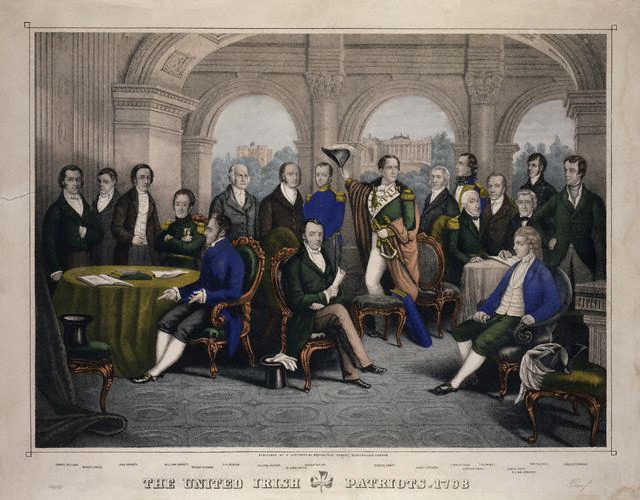Society of United Irishmen
 The Society of United Irishmen was a sworn association in the Kingdom of Ireland formed in the wake of the French Revolution to secure "an equal representation of all the people" in a national government. Despairing of constitutional reform, and in defiance both of British Crown forces and of Irish sectarian division, in 1798 the United Irishmen instigated a republican rebellion. Their suppression was a prelude to the abolition of the Irish Parliament in Dublin and to Ireland's incorporation in a United Kingdom with Great Britain. An attempt, following the Acts of Union, to revive the movement and renew the insurrection led to an abortive rising in Dublin in 1803.
The Society of United Irishmen was a sworn association in the Kingdom of Ireland formed in the wake of the French Revolution to secure "an equal representation of all the people" in a national government. Despairing of constitutional reform, and in defiance both of British Crown forces and of Irish sectarian division, in 1798 the United Irishmen instigated a republican rebellion. Their suppression was a prelude to the abolition of the Irish Parliament in Dublin and to Ireland's incorporation in a United Kingdom with Great Britain. An attempt, following the Acts of Union, to revive the movement and renew the insurrection led to an abortive rising in Dublin in 1803.Espousing principles they believed had been vindicated by American independence and by the French Declaration of the Rights of Man, the Presbyterian merchants who formed the first United society in Belfast in 1791 vowed to make common cause with their Catholic-majority fellow countrymen. Their "cordial union" would upend Ireland's [[Protestant Ascendancy|Protestant [Anglican] Ascendancy]] and hold her government accountable to a representative Parliament.
As the society replicated in Belfast, Dublin, and across rural Ireland, its membership test was administered to workingmen (and in some cases women) who maintained their own democratic clubs, and to tenant farmers organised against the Protestant gentry in secret fraternities. The goals of the movement were restated in uncompromising terms: Catholic emancipation and reform became the call for universal manhood suffrage (every man a citizen) and for an Irish republic. Preparations were laid for an insurrection to be assisted by the French and by new United societies in Scotland and England. Plans were disrupted by government infiltration and by martial-law arrests and seizures, so that when it came in the summer of 1798 the call to arms resulted in a series of uncoordinated local risings.
The British government seized on the rebellion to argue the greater security of a union with Great Britain. In 1800 the Irish legislature was abolished in favour of a United Kingdom parliament at Westminster. The attempt to restore the movement by organising on strictly military lines failed to elicit a response in what had been the United heartlands in the north, and misfired in 1803 with Robert Emmet's rising in Dublin.
Since the rebellion's centenary in 1898, Irish nationalists and Ulster unionists have contested the Society's legacy. Provided by Wikipedia







![[Commemoration calendar for the 1798 rebellion]](/IIIF/000510000/000508589_34444100813666/vtls000508589_34444100813666_001.jp2/full/100,/0/default.jpg)
![The Society of United Irishmen of Dublin: To the people of Ireland. Beauchamp Baganell Harvey [Beauchamp Bagenal Harvey], Chairman - Thomas Russell, Secretary.](/IIIF/000220000/000216654/vtls000216654_001.jp2/full/100,/0/default.jpg)